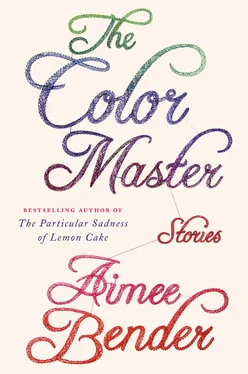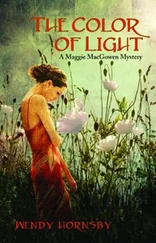“John?” she said.
“John,” I said, chewing the crust. “And his brothers are George and Paul, and his cousins are Rocky and Jo-Jo.”
“And who talks the least?” she asked, brushing ants into the trash can. I watched them climb out.
“Jo-Jo,” I said, “is a quiet sort. By the way, my favorite color is blue.”
“Blue,” she sighed, leaning back on the counter. “That’s a good one. Have you done your homework?”
“All done,” I said. “Did you get a job?”
“Soon,” she said.
(We were smoking at the wall at recess, and one of the Gaths handed me a bag of barbecue chips, and when I took it, he had this look in his eye. Glinty. Looking right at me. “What?” I said. “What?” he said.)
You know what I like to look at? The birdbaths, locked up. The stuffed bear stuck together with staples and tape. The TV. The refrigerator. I like the car. The changing weather. The taste of wrong-color peppermints. The doctor’s neck.
(There’s a photo of the Robertson family in a blue wooden frame that sits on top of the TV that we got done at the department store’s photo department. I try to focus my attention on the TV, but sometimes I glance up by accident. Mostly I just see hair and all of us in our nice shirts and I remember the dick photographer who made us say “buttercream pie,” but once in a while, I look up and it’s a flash, like the photograph is screaming and everything is imprinted there, everything. Like the shape of my mother’s jaw might as well bleed out the word “disappointment” and my dad’s eyes are way far back and blank in his head and Ginny smiles too big like she’s pouring grout on the world and somebody’s flattened me.
One night, Mom held it up during commercials and said, “I think this is my favorite picture of us yet,” because she likes how the angle doesn’t show her double chin and she likes to see Ginny smiling with her pretty teeth and Dad with his hair just cut, and how for once I wasn’t scowling at the camera.
“Look, William, how handsome you are when you’re not being difficult,” she said.
I shrugged at her. “Can’t see it,” I said. “Sorry.”)
I have known them for at least three years, these two; we all went to school together, and at one point I dated the blond but it was brief. The timing was off and both of us were swept along by the river of another match. I have flirted with the brown-haired one for years.
I have this fantasy, I say one evening, when all of us are slightly drunk, sitting on my apartment steps on Gardner on a clear July night. Would you come back? Four o’clock? Saturday?
Sure, they tell me, curious. The word marked by brake lights and bitten fingernails. Everybody facing out. We all hold hands at once, and we are all lonely when we go home, but this is helpful, this hand-holding, this sitting on the stoop of my apartment building, watching while other people look for parking.
I have recently broken up with someone whom I did not expect to break up with, and every morning, the earliest time I wake up is suffused with remembering; I can’t seem to beat that moment, no matter how early I rise. I once thought if I traveled in France I would have a different brain, the brain of a girl who travels in France. I saw myself, skipping through meadows in a yellow-and-blue-print dress. But even with the old buildings, with the bright bready smells, with the painted French sunlight, it was still my same brain in there, chomping as usual, just fed this time by baguettes and Brie.
In the mornings I write long circular journal entries when I wake up. Too early. Before work. But even though I am making steady proclamations about who I will go for next, and why, and how it will all be different, it is brutal to imagine the idea of meeting a new person. Going through the same routine. Saying the same phrases I have now said many times: the big statements, the grand revelations about my childhood and character. The cautious revealings of insecurities. I have said them already, and they sit in the minds of those people who are out living lives I have no access to anymore. A while ago, this sharing was tremendous; now the idea of facing a new person and speaking the same core sentences seems like a mistake, an error of integrity. Surely it is not good for my own mind to make myself into a speech like that. The only major untouched field of discussion will have to do with this feeling, this tiredness, this exact speech.
The next person I love, I will sit across from in silence. We will have to learn it from each other some other way.
On Saturday, there’s a knock at the door right at four, and I open it up. Hi! Hi, hi. We’re all joking and nervous, and they brought beer. Me too. I usher them in. My apartment sometimes reminds people of a warehouse; the space is high and elongated and feels empty. The living room is a stripe. It’s too narrow to watch TV in, so I put the furniture on a diagonal.
They both look great, thriving out of control. These are solid men, with square kneecaps and loving mothers, who are still sort of awed by women. They have a line of fur instead of hair at the napes of their necks, sometimes dusting the hinge of their cleanly shaven jaws. Me, I’m clothed and workmanlike in overalls with many pockets. A red tank top, legs covered. They have had crushes on me at some point, and me on them, but everyone knew that friendship was best, and it is in this spirit that they walk through my door. They’re good at the greeting hug routine. There is a wild fondness in the air. We grab beers, twist off, fling bottle caps into the air.
They’re friends with each other, too. Sometimes they play soccer together.
They said they would do what I asked them to. That’s the agreement. It’s a four o’clock afternoon and the July sun is lazy and inviting and it’s a second-floor apartment, so it’s always a little warm from the rising heat, and here are these two men I’ve captured, inside my house, wearing worn white T-shirts. One of them has a stain right in the middle from the peach cobbler he ate at lunch, left over from the potluck he went to Friday night at Valerie’s. He is the type everyone gives their leftovers to at the end of the party, because they know he will eat them, and he does. Somehow this makes me proud. Whenever these two walk down hallways, or through crosswalks, in their tall boyishness I feel a surge of pride that is faintly motherly and also not. I want to fuck and birth them at the same time.
Today, they have another beer. Me too. We joke around. We play bottle-cap hockey. I serve cookies on a chipped green plate. They eat them, fast. They have sweet tooths, they say. One prefers the chocolate chip; the other enjoys the texture of oatmeal. They’re deep in the stripe, by the windows at its end, and I sit down in the chair that I’ve placed closer to the door. Stay over there, I tell them, as they swallow the last two bites off the plate. All right, they say. They sprawl out on the carpet, hands propping up their heads, and they know how to own space, how to feel important without realizing it. They have never questioned their right to be alive; it is borne in them, and obvious. One is wearing shorts and has blond hair all over his pale knees. Like poured milk from a glass carton.
Okay, I say, after the third beer is finished. I bring out tequila. I give each of us two shots. Down, down, down.
Then: Just touch hands, I say.
One touches his own hands. No, I say. His. His hand. Touch that.
It takes until just now for them to realize I want them to touch each other. They have assumed they’ll be touching me. I don’t have shoes on, but I have the rest on, and maybe a ponytail. I’m in the day. Just touch hands, I say. Gently. Please. They look bewildered—not upset, just unsure. They will need my constant reassurance. This is why I will not feel left out.
Читать дальше












